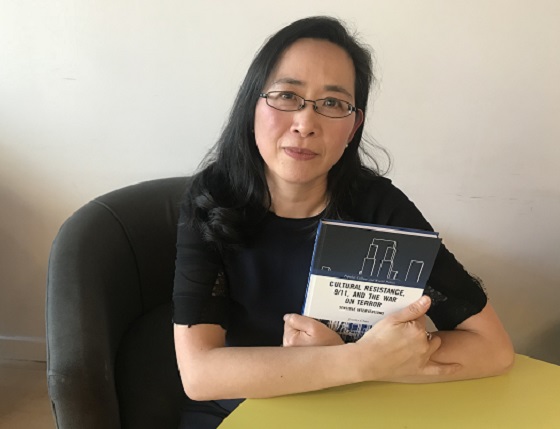How the September 11 terrorist attacks shaped society and affected people’s thinking has been critically analysed by a De Montfort University Leicester (DMU) academic.
Dr Jenifer Chao from the Leicester Media School has explored the cultural legacies of 9/11 in her first book, which is now on sale.

The Journalism Lecturer examines how the New York terrorist attacks had a widespread but often under-analysed global impact on contemporary culture and politics.
The book Cultural Resistance, 9/11 and the War on Terror looks at the influence of the terrorist attacks ‘in all kinds of unexpected places.’
Dr Chao, a Chinese-American, was drawn to the alternative analysis of 9/11 as at the time of the attacks in 2001 she was living in the Netherlands. She calls it “a decisive moment” that she no longer felt a sense of belonging and identity as an American.
She said: “The attacks led to a surge of American nationalism and patriotism, but I felt very estranged from my own country.
“I felt drawn to 9/11 for different reasons; I was more drawn to the narratives, objects and images that told alternative stories about 9/11.”
The book is based on four case studies, which make up the four chapters - a television situation comedy, a hip-hop album, a novel, and a collection of studio photographs.
Dr Chao looks at how they engaged with issues such as War on Terror policies, American national identity and representations of Muslim/Islam. She said researching the book had pushed her “beyond her own intellectual limitations.”
Dr Chao said: “The topic transgressed all kinds of disciplinary and media boundaries.
“I had to broaden my horizons as the very nature of the catastrophe is its all-encompassing and influential nature.
“I wanted to tell a different story about 9/11 beyond the normal impact of politics and nationalism.”
Dr Chao’s career started as a journalist. She worked for six years as a foreign correspondent for the international press agency The Associated Press, based in Amsterdam.
She studied for an MA in English Literature and Culture at the University of Amsterdam, and then gained a PhD in Cultural Analysis.
Her PhD thesis on 9/11 took five years to complete, then after a further three years of research and rewriting, her book was published.
Dr Chao said: “As a journalist I had to cover 9/11 and had written a few articles but I was not well informed about its global impact.
“I hadn’t had any further involvement and had not fully immersed in any academic debates.
“I probably had quite a narrow vision of what politics was, but I had to quickly learn how what is political can extend to all of culture, including media, music, art and literature.
“The cultural politics of the attacks was a completely new concept to me, and I became engrossed in the topic.”
RELATED NEWS
Find out more about DMU at our next Open Day
New generation of investigative journalists graduate
Students visit 9/11 museum as part of #DMUglobal trip to New York
Dr Chao’s research included her reviewing and analysing everything with any kind of 9/11 connection or reference, for example, art, photography and poetry.
She said: “I had to learn so many different ways to analyse popular culture as I was trying to understand the complexities.
“I was looking at these alternative narratives as new ways to understand global terrorism. I’ll never look at terrorism in the same way again.”
Dr Chao recently launched the book at a conference organised by Leicester Media School’s Media Discourse Group saying it was “a big relief to have closure.” She celebrated with a family dinner and is now incorporating her research into her teaching at DMU.
Dr Chao said: “I hope my book will be discussed. I want it to get people talking, to start conversations and I want to inspire my students to do further research.”
She has also already started work on her new research project, which assesses the visual and cultural politics of reinventing China as a nation brand.
Cultural Resistance, 9/11 and the War on Terror is available from Routledge as a hardback or eBook. For further information, visit the Routledge website.
Posted on Friday 16 March 2018